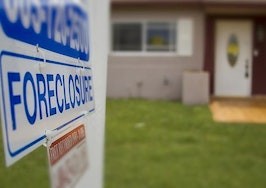New York and Florida are the states with the highest number of vacant homes, according to a new Attom Data Solutions study released today.
Across the country, just over 1.53 million single-family homes and condos currently sit vacant in the third quarter of 2019. This represents 1.6 percent of all homes.
Overall, fewer homes are being left vacant or otherwise abandoned than in prior years. Some 304,000 homes are currently in the process of being foreclosed, or seized by the government due to the owner’s inability to make mortgage payments. This is a 22 percent drop since 2016, when Attom last released a foreclosure vacancy report.
The number of “zombie foreclosures” — properties that have been abandoned by their owners after facing foreclosure — has been cut nearly in half, to 9,612 homes.
“The blight of vacant, decaying properties facing foreclosure has declined dramatically across the United States – another good-news offshoot of the housing boom that’s gone on for eight years,” said Todd Teta, chief product officer with Attom Data Solutions, in a prepared statement.
That said, home abandonment is a bigger problem in some parts of the country than it is in others. At 2,428 and 1,634 vacant properties, New York and Florida led the list of states with the highest number of zombie foreclosures. Illinois (985 homes), Ohio (891 homes) and New Jersey (463 homes) rounded out the top five.
Some cities also face vacancy crises of their own. Peoria, in central Illinois, in particular seems to be struggling. It has the highest vacancy rate, 16.5 percent, among metropolitan areas with at least 100,000 residential properties. Wichita, Kansas, and Syracuse, New York, followed at 9.5 percent and 9.3 percent, respectively. When broken down by zip code and county, areas in Peoria also had the highest rates of owner-vacated properties.
But despite struggling individual areas, the strong job market and positive economic outlook is contributing to fewer abandoned homes overall. That number is expected to shrink even more in the coming months and years.
“A handful of areas still face notable problems with homes abandoned by owners after they get hit with foreclosure claims,” Teta said. “But with the economy improving and the housing market still hot, an expanding number of neighborhoods across the country face little or no problem with these so-called zombie properties.”
To create the report, Attom analyzed county tax assessor data on more than 98 million properties in metropolitan statistical areas with at least 100,000 single-family homes and condos and counties with at least 50,000.












